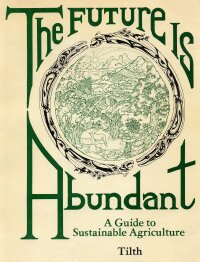Tilth Producers of Washington Home | WA Tilth Assoc. | Conference | Directory | Journal | Placement Service | Calendar | Action Alerts
Legislative Update | Bulletin Board | Classifieds | Questions on Agriculture? | Photo Gallery | Links | Contact Us | Join Now | Volunteer

The Future is Abundant
A Guide to Sustainable Agriculture
Back to the Table of Contents
Sustainable Agriculture
Agriculture and forestry are cultural and ecological enterprises. A number of nations are developing approaches to the producation of farm and forest resources which rely less on industrial processes and more on ecological principles.
The International Federation of Organic Agriculture Movements (IFOAM) is a global network linking people who are actively creating a new agriculture. In mid-October, 1977, nearly 200 members from around the world gathered in Ebenrain, Switzerland for an international research conference. Below is an excerpt from the introduction to the conference in which Colin Fisher of England's Pye Research Center defined the components of a sustainable agriculture. It is reprinted from the conference proceedings, Towards a Sustainable Agriculture, Besson & Vogtmann, eds.
Colin Fisher
What do we mean by "a sustainable agriculture"? There are, in my view, eight basic components which are a prerequisite for the achievement of "sustainability" in an agricultural system:
- Paradoxically, I would nominate "dynamism" in the system as the first of these. In biological systems that which is static is rarely sustainable. A sustainable agriculture is, therefore, of a kind which improves rather than deteriorates in response to the demands made on it and the menthods employed in the achievement of optimum production.
- Even more obviously, a "sustainable system of agriculture" must be one that achieves the production of crops and livestock and the management of the farm's resources in a way that harmonises rather than conflicts with natural systems. This does not mean that we must always despise to use those resources which are devised by man (sic) rather than the bounty of nature. To do so would, in my view, be to treat with contempt the very special gift of intelligence which distinguishes us from other species. Nor need a "sustainable" system be entirely self-sufficient. Too dogmatic a pre-occupation with self-sufficiency can result in a waste of resources. The efficient use of resources (be they natural or devised by man) is the key to the dynamism of constant improvement, and the test of the validity of the resource input should be that it contributes to what I will call "dynamic sustainability."
- Thirdly, I believe that the system must be diverse and that we have yet to achieve sufficient understanding of the way we must plan and design for diversity in the pursuit of optimum production.
- Next, our "sustainable agriculture" must be one which relies primarily on renewable resources for the achievement and maintenance of the basic fertility essential to optimum production.
- The system must be one in which the input of thought, ingenuity, care and personal involvement can be judged to be more significant than the inputs of technology, although I believe our requirement for technology will increase rather than diminish in response to our closer understanding of biological systems. It is, however, unlikely that the sort of technology I have in mind would resemble the crude technologies, both mechanical and chemical, which characterise the sort of agriculture with which all of us from industrialized countries are familiar.
- A "sustainable agriculture" should be one which recognizes the contribution of good nutrition to the health of populations and accepts that the farmer or producer has a special responsibility to ensure, not only that he or she eliminates hazards of toxicity, but enhances (within the limits of what can be understood) the potential for discriminating between the mediocre, the good and the excellent in aiming always for the optimum nutritive value of staple foods.
- "Sustainability" must embrace more than crops, livestock and the soils which support their production. It must also include the people who work or live on the holding, and the relationship of the holding to the rest of the rural community in which it is situated. "Sustainability" is about sociology as well as biology.
- I will complete my list by urging that a farm system is more likely to be "sustainable" if it is aesthetically pleasing to those who work on or live near it, and if it enhances rather than scars (as is often the case) the landscape of which it forms a part. Individually and collectively we are more likely to help "sustain" that which pleases rather than disturbs us.
It would not be difficult to add to my list and, in particular, to discuss the economic (I use the term in its broad not its purely fiscal sense) implications of "sustainability."
Synthesized to its finest a "sustainable agriculture" is about the pursuit of excellence. There can be few areas of human activity where excellence proves itself so exclusive as in agriculture. But to strive for less than excellence is to betray that very special responsibility that is both the burden and the privilege of those of us to whom the ownership or management of a farm is entrusted.
From The Future is Abundant, A Guide to Sustainable Agriculture, copyright 1982 Tilth, 13217 Mattson Road, Arlington, WA 98223.
Tilth Producers of Washington Home | WA Tilth Assoc. | Conference | Directory | Journal | Placement Service | Calendar | Action Alerts
Legislative Update | Bulletin Board | Classifieds | Questions on Agriculture? | Photo Gallery | Links | Contact Us | Join Now | Volunteer

